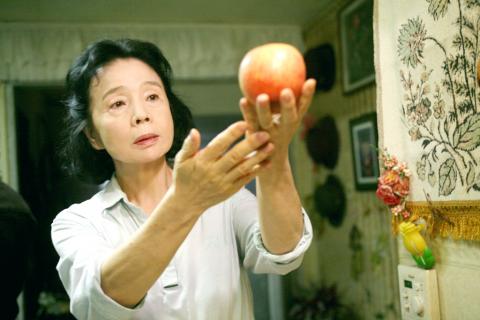It’s a good week for movies from South Korea. Those looking for a thrill ride will find it in The Man From Nowhere (see Other Releases), while Poetry offers a moving contemplation of the fragility of life by veteran director Lee Chang-dong.
Lee tells a remarkably simple story, but does so with enormous power and great assurance. Poetry is about Mija, an elderly woman facing her own degeneration as Alzheimer’s very gradually destroys her world from the inside. At this difficult time, she also learns that her high school-aged grandson, Wook, is implicated in the bullying and gang rape of a female classmate, who commits suicide. Mija, a simple woman who works as a carer and maid, does not know how to express her sorrow at the death of a girl she never knew or how to respond to the moral indifference of her grandson and the parents of the other boys involved, who are primarily concerned with negotiating a financial settlement with the dead student’s mother.
Poetry, which runs for more than two hours, watches as Mija struggles with the issues that her grandson’s actions have placed before her. There is little that is explicit, and Lee is content to allow implications to gradually accrete into a mood of moral unease. The director relies heavily on the skills of veteran actress Yu Jeong-hie, who he invited out of retirement to play the role of Mija. The challenges of the part are enormous, for Mija is not a particularly articulate person, and she is also very much locked into the traditional subservience of her generation of Asian womanhood.

Photos courtesy of Zeus Film
Despite being deprived of the usual dramatic props, Yu insinuates her presence into every part of the story. Lee allows the camera to linger on her, then wander across the face of the respectably shabby neighborhood where she lives, letting the audience sink into its own contemplative mood, and discover its own understanding of who Mija really is.
The title of the film comes from the fact that Mija, at the beginning of the film, joins a poetry class held at her local activity center. The poet teaching the course encourages his students to look at the things around them with new eyes. Mija tries this with an apple in her kitchen, notebook at the ready. Inspiration does not come, so she takes a bite instead, commenting that the fruit is better for eating than for waxing poetic. It is a moment of wry humor that cuts through the earnestness of the film like vinegar in oil.
While Lee is an apostle for the value of reading and writing poetry, he seems to recognize in the sometimes slightly patronizing language of the lecturer and the respectful hush of group readings that it could come across as a little absurd. Yet he has a profound belief in the value and discipline of poetry, and one strand within the film is the disjunction between this value and the perception of poetry’s irrelevance to contemporary life.

Photos courtesy of Zeus Film
Mija spends the movie learning to see in a new way, but not from directly contemplating apples and trees. Her grandson’s actions put her under enormous pressure, and lead her to acts of greater compassion and a fiercer determination than she has probably ever known in her small suburban life. What happens in her mind, as opposed to whether her grandson is punished for his actions, is the real focus of Poetry.

June 2 to June 8 Taiwan’s woodcutters believe that if they see even one speck of red in their cooked rice, no matter how small, an accident is going to happen. Peng Chin-tian (彭錦田) swears that this has proven to be true at every stop during his decades-long career in the logging industry. Along with mining, timber harvesting was once considered the most dangerous profession in Taiwan. Not only were mishaps common during all stages of processing, it was difficult to transport the injured to get medical treatment. Many died during the arduous journey. Peng recounts some of his accidents in

“Why does Taiwan identity decline?”a group of researchers lead by University of Nevada political scientist Austin Wang (王宏恩) asked in a recent paper. After all, it is not difficult to explain the rise in Taiwanese identity after the early 1990s. But no model predicted its decline during the 2016-2018 period, they say. After testing various alternative explanations, Wang et al argue that the fall-off in Taiwanese identity during that period is related to voter hedging based on the performance of the Democratic Progressive Party (DPP). Since the DPP is perceived as the guardian of Taiwan identity, when it performs well,

The Taiwan People’s Party (TPP) on May 18 held a rally in Taichung to mark the anniversary of President William Lai’s (賴清德) inauguration on May 20. The title of the rally could be loosely translated to “May 18 recall fraudulent goods” (518退貨ㄌㄨㄚˋ!). Unlike in English, where the terms are the same, “recall” (退貨) in this context refers to product recalls due to damaged, defective or fraudulent merchandise, not the political recalls (罷免) currently dominating the headlines. I attended the rally to determine if the impression was correct that the TPP under party Chairman Huang Kuo-Chang (黃國昌) had little of a

A short walk beneath the dense Amazon canopy, the forest abruptly opens up. Fallen logs are rotting, the trees grow sparser and the temperature rises in places sunlight hits the ground. This is what 24 years of severe drought looks like in the world’s largest rainforest. But this patch of degraded forest, about the size of a soccer field, is a scientific experiment. Launched in 2000 by Brazilian and British scientists, Esecaflor — short for “Forest Drought Study Project” in Portuguese — set out to simulate a future in which the changing climate could deplete the Amazon of rainfall. It is